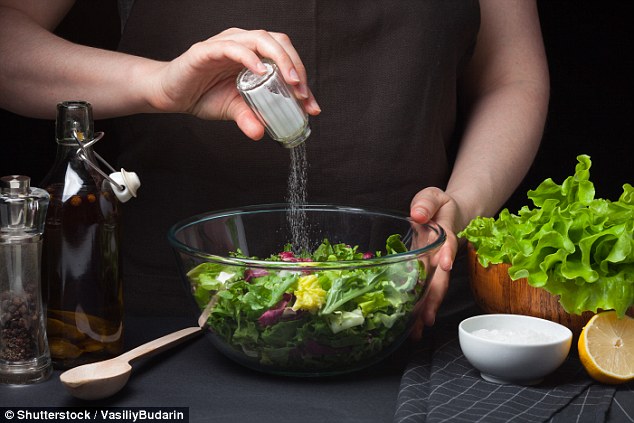Even double the daily limit won’t increase your heart attack risk, study claims
For most people the amount of salt they eat is not harmful, a controversial new study has found.
Health guidelines say any more than 0.75 teaspoons a day increases your risk of a heart attack.
But the new study by McMaster University in Ontario found that anything under two-and-a-half teaspoons (five grams) – which is standard for most people – is safe.
And for those who do eat too much, they can balance out the health risk if they eat plenty of fruit, vegetables and other potassium-rich foods, according to Daily Mail.
The authors suggest urging people to cut their sodium intake may be needed in countries like China that eat more salty foods, but may be unnecessary in most of Europe and North America.
‘There is no convincing evidence that people with moderate or average sodium intake need to reduce their sodium intake for prevention of heart disease and stroke,’ said lead author Martin O’Donnell, associate clinical professor of medicine.
The study followed 94,378 people, aged 35 to 70, for an average of eight years in 18 countries.
It found there was an associated risk of cardiovascular disease and strokes only where the average intake is greater than five grams of sodium a day.
Those who consumed more than 7g a day had an increased risk of cardiovascular events and mortality in people with high blood pressure.
And low sodium of below 3g a day was associated with an increased risk of cardiovascular events and mortality in people with or without hypertension.
But there is good news even for those who eat high amounts of salt as any health risk of sodium intake is virtually eliminated if they improve their diet quality by adding fruits, vegetables, dairy foods, potatoes, and other potassium rich foods.
In China, over four-fifths exceeded this but in other countries the majority had an average sodium consumption of three to five grams a day.
The study found higher sodium intake was associated with increased blood pressure and increased incidence of stroke, but this was found mainly in countries like China with very high sodium intake and not others.
Higher sodium intake was associated with lower rates of myocardial infarction and total mortality.
‘The World Health Organization recommends consumption of less than two grams of sodium – that’s one teaspoon of salt – a day as a preventative measure against cardiovascular disease, but there is little evidence in terms of improved health outcomes that individuals ever achieve at such a low level,’ said Associate Professor Andrew Mente.
‘Only in the communities with the most sodium intake – those over five grammes a day of sodium – which is mainly in China, did we find a direct link between sodium intake and major cardiovascular events like heart attack and stroke.
‘In communities that consumed less than five grammes of sodium a day, the opposite was the case.
‘Sodium consumption was inversely associated with myocardial infarction or heart attacks and total mortality, and no increase in stroke.’
Furthermore, rates of stroke, cardiovascular death, and total mortality decreased with increasing potassium intake in these communities.
Diets rich in fruit and vegetables are high in potassium but it is not known whether potassium itself is protective, or whether it might simply be a marker of a healthy diet.
Dr Mente said: ‘We found all major cardiovascular problems, including death, decreased in communities and countries where there is an increased consumption of potassium which is found in foods such as fruits, vegetables, dairy foods, potatoes and nuts and beans.
‘Our study adds to growing evidence to suggest that, at moderate intake, sodium may have a beneficial role in cardiovascular health, but a potentially more harmful role when intake is very high or very low.
‘This is the relationship we would expect for any essential nutrient and health.
‘Our bodies need essential nutrients like sodium, but the question is how much.
‘The recommendation to lower sodium consumption to 2g/day is based on short-term trials of sodium intake and blood pressure, and the assumption that any approach to reduce blood pressure will necessarily translate into a lower risk of cardiovascular disease with no unintended consequences.
‘While low sodium intake does reduce blood pressure, at very low levels it may also have other effects, including adverse elevations of certain hormones associated with an increase in risk of death and cardiovascular diseases.’
Commenting on the study Franz Messerli and Louis Hofstetter, Bern and Sripal Bangalore said two years ago Dr Mente and colleagues said salt restriction reduced the risk of heart disease, stroke, or death only in patients who had high blood pressure, and salt restriction could be harmful if salt intake became too low. But this was branded ‘bad science’ by their critics.
Of the new study they added ‘there is little doubt that with the notable exception of benefits of increasing potassium intake, the findings of Mente and colleagues will again give rise to controversy.’
N.H.Kh

